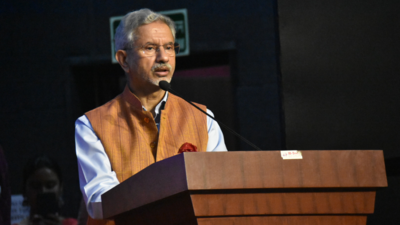Welcome To Latest IND >> Fastest World News
NEW DELHI: External affairs minister S Jaishankar on Sunday spoke about India’s strategic position in world affairs, its pursuit of
global engagement
, and the importance of balancing friendships while minimising conflicts. He said that since India had been ruled by foreign power for so many years, it now doesn’t want to be ever tied to a foreign power “where they have too much of an influence on our decision-making”
Addressing students at IIT (BHU) Varanasi, Jaishankar said that global relevance comes with its own set of challenges, saying, “You can have no enemies and be irrelevant.
If you are relevant, some problems will accompany it.”
Speaking on the concept of ‘Vishwa Bandhu’, he explained that global engagement is unavoidable in an interconnected world. “The whole concept of Vishwa Bandhu is how a country can maximise its friends and minimise its problems… It is not a passive concept. It requires credibility,” he stated. He pointed out that every aspect of a nation’s activities now has a global dimension and that ensuring a strong international presence requires both proactive engagement and resilience in the face of inevitable challenges.
Jaishankar noted that India’s historical experience under colonial rule has shaped its strong sense of independence. “As a country which, for many years, was ruled by a foreign power, there is a great deal of sensitivity to independence. We don’t want to be ever tied to a foreign power where they have too much of an influence on our decision-making,” he said. This independent streak, he argued, remains a guiding principle in India’s diplomatic approach, ensuring that the country does not become overly reliant on any single foreign partner.
Discussing India’s
strategic partnerships
, Jaishankar highlighted the complexity of managing relationships with global superpowers while maintaining national interests. “But remember we are also a big country and big countries typically have so many interests that they cannot necessarily be tied down to one some other country on all issues. With every country, there will be touch points—things you agree on and things you agree with less,” he observed. He said that India must navigate these relationships carefully, particularly in fields like technology, where geopolitical sensitivities are high.
Jaishankar also spoke about the importance of cultural ties in strengthening national identity. At the Kashi-Tamil Sangamam 3.0 in Varanasi, he highlighted Kashi’s historical significance, describing it as a “cultural magnet” that binds India together. “Kashi is probably one of the world’s oldest continuous cities. For the entire India, Kashi is like a kind of cultural magnet. Tamils have a special affinity towards Kashi, and some years ago, when PM Modi decided to organise the Kashi-Tamil Sangamam, the idea was that because India is a confluence of cultures, languages, and traditions, this connection needed to be reinforced,” he said.
Touching upon India’s role as a technological leader, Jaishankar pointed to the country’s growing influence in modern fields such as artificial intelligence and space exploration. “We have historically been a source of technology for the world in earlier times. I think today we are trying to recover that again, and part of what we are trying to do through the New Education Policy (NEP) is to prepare people for the challenges of the new world,” he said. He highlighted India’s advancements in artificial intelligence, drones, and the space industry, noting that these sectors are being driven by young talent.
Jaishankar also stressed the need to integrate traditional knowledge with modern technology. “Even the Prime Minister says technology and tradition. So tradition can also help technology, and that is where the Indian knowledge system can make a difference,” he said, citing examples of yoga and traditional medicine. “People were sceptical about traditional medicine outside India, but they are now discovering its utility and usefulness. It is up to us to rediscover it and propagate it.”
Latest IND
